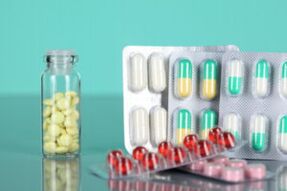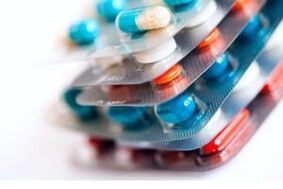Often, doctors in the early stages prescribe treatment for prostatitis with drugs, when an inflammatory process in the prostate gland is diagnosed in men. In fact, the treatment is quite painful and time consuming. Prescription drugs are made exclusively by a specialist based on symptoms and diagnostic indicators.
How to understand that the prostate is inflamed?
Inflammation of the prostate develops quickly and you can understand about the disease when unpleasant symptoms appear:

- decreased sexual desire
- rapid onset of ejaculation.
- a constant feeling of fullness in the bladder.
- and the appearance of discomfort during bowel movement, painful sensations in the perineum.
- the onset of uncontrolled slow erection;
- urination in a thin intermittent stream.
- constant fatigue for no reason.
- increase the temperature to 41 degrees with the addition of bacteria.
It is important to determine the form of the disease, causing factors before starting treatment. For example, in case of stagnation and damage from harmful bacteria, the treatment is mainly with antibiotics to suppress the harmful microflora. The main thing for prostatitis is to choose the most effective drugs.
Medicines, release forms
The treatment of prostatitis includes many drugs with different forms of release. But it is important to understand that one form or another is prescribed taking into account the stage, form, types of disease development, existing symptoms and contraindications for use.
Among all known groups of drugs are used:
- solutions for regulating microcircuits to suppress the inflammatory process.
- tablets, especially antibiotics, as a form of medicine for the treatment of prostate inflammation.
- rectal suppositories with direct action on the affected lesions.
- injections, as a rapidly active form of medicine for the suppression of the inflammatory process in prostatitis.
Many men complain of disorders of the mental and nervous system that require recovery. It is the prostatitis that comes for the stronger sex as a blow below the waist, while the erection worsens sharply and the power decreases significantly. Men begin to be in a state of stress, problems appear in the personal sphere.
Sedatives or antihistamines will help relieve swelling and inflammation, although doses and treatments should not be neglected to avoid side effects and sudden worsening of the condition. In addition, many are interested in how to treat prostatitis in men with drugs and what is better to take: pills or suppositories? The insertion of suppositories involves a close location with the prostate. However, suppositories are safer, do not affect the stomach, dissolve quickly in the rectum and are redirected through the bloodstream to the site of injury. The effectiveness comes after 20 minutes.
If you no longer have the strength to endure the pain, then you can eliminate the problem with pills, although the money enters the stomach and the separation occurs in the liver, when many useful substances have already lost their effect. The tablets work much later, after 40-45 minutes. Therefore, it is better to choose anal suppositories for the treatment and prevention of prostatitis, prostate adenoma.
Prescription drugs
It is important to direct drug therapy to suppress the source of the inflammatory focus.
The drugs are prescribed exclusively by a specialist, taking into account the characteristics of the course of the inflammatory process, the type of disease, the degree and stage of development of prostatitis:

- Antibiotics are prescribed when pathogenic bacteria are detected, an acute course of the disease with a treatment of 6 weeks - 2 months.
- Macrolides in the chronic course of the disease.
- Non-steroidal anti-inflammatory drugs with direct action on the source of inflammation.
- Decongestants, sedatives for excessive swelling of the prostate, painful urination.
- Hormonal factors by reducing erectile function in order to restore and normalize the endocrine system.
- Adrenergic blockers for urinary problems to normalize urine output, relieve inflammation and pain when urinating.
- The rectal suppositories aim at the direct action on the inflammatory source to suppress the negative processes. These are the safest drugs that can not reduce liver and kidney function, but do a great job of fighting harmful germs. Suppositories are a great addition to antibiotics in case of weakened immunity to suppress harmful microflora, when strong antibiotics also kill the beneficial flora in the body. Suppositories are considered safer and more effective.
- Immunoregulators to boost local immunity.
- Muscle relaxants to suppress pain, normalize blood flow to the prostate gland, drain completely.
- Pain relievers for cuts in urine output, severe pain in the form of release in injectable, tablets.
- Sedatives to restore the nervous system, relieve overstimulation, calm down. In many men, prostatitis clearly affects the soul and does not affect the nervous system in the best way.
- Sedatives for severe mental disorders in order to increase activity, normalize blood circulation and the urinary process.
- Decongestant antihistamines to relieve prostate enlargement.

On a note! Some sedatives are addictive, so it is not recommended to violate the dosage and duration of administration. According to doctors, it is better to use a liquid form of medication with a rapid effect on the source of pain. The suppositories can be used in the form of an enema, when swallowing the composition in the urethra quickly suppresses the pain.
Only complex treatment will become more effective and recovery will be faster. In addition, the conduct of a physiotherapy course and receiving folk remedies using at home will not be superfluous. It should be understood that if you do not start treatment with medication in time, the disease will quickly turn into a chronic stage. In the absence of an erection in the morning, clear signs of a power outage, lower abdominal pain, you should contact a urologist immediately. Without knowledge, you should not independently prescribe prostatitis medication with unknown drugs, resorting to lethal doses in an effort to recover faster. This will not relieve it, but other health problems and serious complications will occur.
Great! Improper treatment can lead to serious consequences: adenoma, prostate cancer, transition of the disease to a chronic form
Which is more appropriate: anti-inflammatory or antibiotic drugs?

- If acute prostatitis is detected, then antibiotics from the fluoroquinolone group are recommended.
- If the prostatitis has a chronic course, then it is best to take macrolides or tetracycline antibiotics.
- If non-bacterial prostatitis is detected, then antibiotic treatment may simply be ineffective. It is best to take anti-inflammatory drugs from the NSAID group.
Caution! When taking NSAIDs, it is recommended that you take short-term courses, leaving 1 week between them.
Which is better: suppositories or pain pills?
Rectal suppositories do not interact with the digestive system, liver and kidneys, therefore, are considered safer and are used to adjust the treatment of prostatitis, relieve inflammation, pain and swelling, and normalize urination.
The use of pain pills is recommended in case of severe pain, although analgesics with uncontrolled use can cause side effects and complications.
If there is pain in the perineal area, then it is recommended to take muscle relaxants to reduce muscle tone in the groin. Non-steroids, which are best used in anal suppositories, will help relieve swelling and pain. The best medicines are natural herbal products based on medicinal herbs.
It is important to understand that if the inflammation of the prostate gland is caused by bacteria, then it is better to be treated with antibiotics, but neglect the dose and time frame of treatment. To cure prostatitis, to forget forever the inflammatory process and congestion, means to strictly follow all the recommendations of specialists, to use the drugs in a timely manner and according to instructions.






































